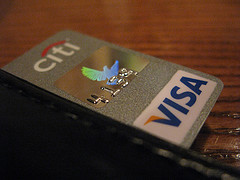Senator Asks Citi To Stop Reporting Frequent Flier Miles As Taxable Income
As we mentioned last week, a number of Citi customers around the country have been scratching their heads wondering why they received 1099 tax forms from the bank over frequent flier miles, even though IRS policy explicitly states that the agency as no interest in going after freebie miles as taxable income. Now the chair of the Senate Banking Subcommittee on Financial Institutions and Consumer Protection has fired off a missive to Citi asking the CEO to not be such a pain in the rear-end to its customers.
Here is the text of the letter from Ohio Senator Sherrod Brown to Citi CEO Vikram Pandit:
Dear Mr. Pandit:
As Chairman of the Senate Banking Subcommittee on Financial Institutions and Consumer Protection, I write to express my concern regarding recent reports that Citibank is sending 1099 tax forms to customers who received frequent-flier miles as a reward for opening a checking or savings account.
During these challenging economic times, middle-class families are pinching pennies to help pay for the cost of a flight to fly home from college, visit an ailing relative, or see friends. To some, signing up for a bank account in exchange for frequent-flier miles to help make a trip more affordable is an offer that is too good to resist. However, your actions are leaving working families with the seemingly incorrect impression that when they rack up miles, they are hiking up their taxes, too.
Citibank arbitrarily calculates the value of each frequent flier mile as 2.5 cents of taxable income. Based upon its incorrect interpretation of a rule requiring individuals to report rewards and prizes as taxable income, Citibank has been sending its customers 1099 tax forms to report their frequent-flier miles. A spokesperson stated that the bank is following instructions from the 2012 Internal Revenue Code, and that income tax must be paid if at least $600 in “prizes and awards” is received. These miles are neither a prize nor an award.
Furthermore, the Internal Revenue Service (IRS) has made clear that frequent-flier miles are not taxable income. In a ruling made in 2002 – which still stands – the IRS highlighted that frequent-flier miles are not subject to income tax due to the “numerous technical and administrative issues relating to these benefits.” Furthermore, the IRS stated that it “will not assert that any taxpayer has understated his federal tax liability by reason of the receipt or personal use of frequent-flier miles or other in-kind promotional benefits attributable to the taxpayer’s business or official travel.”
Most importantly, given the IRS’s ruling, why is Citibank sending its customers 1099 tax forms? Reporting frequent-flier miles as taxable income is inconvenient to consumers, raises their anxiety unnecessarily, and is not required by law.
I urge Citibank to halt this practice. The last thing Citibank should be doing is creating baseless fear in middle class families, or placing a nonexistent tax burden on the backs of families who are already struggling to make ends meet.
Thank you for your consideration of this matter.
Sincerely,
Sherrod Brown
UPDATE:
A rep for Citi sent the following comment to Consumerist:
Rewards and airline miles that are provided in connection with a purchase on a credit card are routinely not subject to individual income tax reporting. When a customer receives a gift for opening a bank account – whether cash, a toaster or airline miles – the value of that gift is generally treated as income and subject to reporting. This is separate and distinct from miles or points earned by our credit card customers for their purchases.
He also points us to a Time.com article wherein an IRS rep says, “When frequent flyer miles are provided as a premium for opening a financial account, it can be a taxable situation subject to reporting under current law.”
Want more consumer news? Visit our parent organization, Consumer Reports, for the latest on scams, recalls, and other consumer issues.


